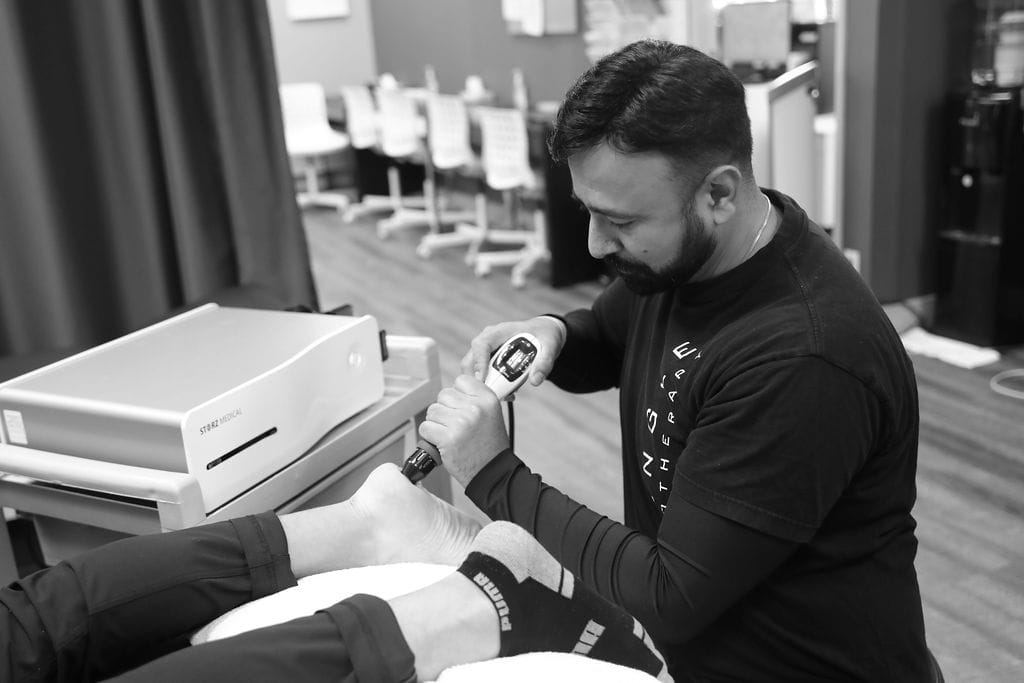Yes, a physiotherapist can definitely help with plantar fasciitis. They can provide specialized exercises, stretching techniques, and other treatments to alleviate pain, improve mobility, and promote healing of the plantar fascia.

What is plantar fasciitis and what causes it?
Plantar Fasciitis is a painful condition resulting from inflammation of a band of connective tissue located on the bottom side of the foot known as the Plantar Fascia. This band of connective tissue runs from the heel of the foot, all the way to the base of each toe, and it functions to support the arch of the foot, especially during weight-bearing.
What are the symptoms of plantar fasciitis?
The pain associated with Plantar Fasciitis is located on the bottom of the foot, with it often manifesting around the heel and along the inside of the foot. It is common for this pain to be at its worst first thing in the morning, and it is usually accompanied by other symptoms, such as stiffness, weakness, swelling, and decreased proprioception.
How is it diagnosed by a physiotherapist?
A Physiotherapist will run a thorough examination of the problem to ensure a proper diagnosis is obtained. This will include getting a detailed history, observing the area and how you function, and running through a series of specific tests. From there, an individualized treatment plan will be made for you to help you achieve your goals and assist you on your road to recovery.
Who is the most at risk to develop this condition?
Plantar Fasciitis is more common in people who can relate to the following:
- Have flat feet or high arches
- Have tight calf muscles
- Wear improper footwear
- Engage in repetitive physical activity (overtraining)
- Suddenly changed activity levels (increased frequency, duration, or intensity)
- Suddenly changed activity or training environment
- Work in an environment that requires prolonged standing
What is the best treatment for plantar fasciitis?
Physiotherapy is considered to be very effective in treating plantar fasciitis. The treatment starts with managing the initial pain and symptoms after which the soft tissue is gradually loaded to promote strengthening so that the condition does not reoccur.
What does plantar fasciitis treatment look like?
Plantar Fasciitis treatment can include one or more of the following:
- Rest: Avoid activities that worsen the pain and give your feet time to heal.
- Ice: Applying ice to the affected area can help reduce inflammation and pain.
- Stretching: Regularly perform calf and foot stretches to help improve flexibility and reduce tension on the plantar fascia.
- Footwear: Choose supportive and cushioned shoes that provide proper arch support.
- Orthotics: Custom or over-the-counter shoe inserts can help distribute pressure evenly on the foot.
- Night splints: These devices keep the foot in a stretched position overnight to alleviate morning pain.
- Physiotherapy: A physiotherapist can guide you through exercises and treatments to aid recovery.
- Extracorporeal Shock Wave Therapy (ESWT): In some cases, this treatment may be used to stimulate healing.
Click HERE to book an appointment with a physiotherapist at one of our eight locations.
- Physiotherapy Etobicoke – Triangle Physiotherapy Etobicoke
- Oakville Physiotherapy Clinic – Triangle Physiotherapy Oakville
- Physiotherapy North York – Triangle Physiotherapy North York
- Mississauga Physiotherapy Clinics – Triangle Physiotherapy Mississauga
- Downtown Physiotherapy Clinics – Triangle Physiotherapy King West
- Uptown Physiotherapy Clinics – Triangle Physiotherapy Lawrence Park
- Physiotherapy Clinic Downtown Toronto – Triangle Physiotherapy Queens Quay
- Physiotherapy Clinics Mississauga – Triangle Physiotherapy Erin Mills
“Plantar fasciitis can be effectively managed with the help of a skilled physiotherapist. Triangle Physiotherapy offers expert care across the GTA, including Physiotherapy in Etobicoke, Oakville, North York, Toronto, Lawrence Park, Queens Quay, Erin Mills, Mississauga, and Liberty Village. Our experienced team can develop a personalized treatment plan to alleviate your symptoms and help you get back on your feet.”




